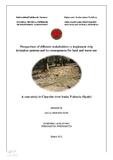Mostrar el registro sencillo del ítem
Perspectives of different stakeholders to implement drip irrigation systems and its consequences for land and water use: A case study in Cànyoles river basin, Valencia (Spain)
| dc.coverage.spatial | east=-0.5000403000000001; north=39.02476559999999; name=Valencia, España | |
| dc.creator | Sese Mínguez, Saioa | es_ES |
| dc.date.accessioned | 2012-04-19T07:49:17Z | |
| dc.date.available | 2012-04-19T07:49:17Z | |
| dc.date.issued | 2012 | |
| dc.identifier.other | 0000577707 | es_ES |
| dc.identifier.uri | https://hdl.handle.net/2454/4731 | |
| dc.description.abstract | El objetivo de este trabajo es investigar el proceso de introducción y expansión de las tecnologías de goteo en un caso de estudio en Valencia, en el valle del Cànyoles. La importancia del trabajo yace en que el 80% del agua dulce mundial se utiliza para regadío por lo que si las nuevas tecnologías reemplazan al riego tradicional es esencial conocer los efectos producidos al detalle . Así, se estudiará que el aumento de superficie irrigado, el coste y consumo de energía y el ahorro del agua juegan el papel más importante en los sistemas localizados. Además, se le dedica una sección al patrimonio del agua en esta área de Valencia tan rica en historia relacionada al regadío Islámico. | es_ES |
| dc.description.abstract | Approximately from the nineties of last century irrigation modernization initiatives have been promoted by the European Water Framework Directive in Spain with the aim to achieve water savings. In Cànyoles river basin (Valencia), those initiatives were also noted and derived in a change from the typical open surface irrigation canals that Muslims introduced in the XIII century, to closed pressurized systems. Nevertheless, how the initiatives are perceived at field level by farmers and the reasons why they adopt new technology are different to the written promoted ideas. One of the challenges is to study how different stakeholders look at drip irrigation systems: as a water saving tool, as a technology that will help to achieve sustainability, as a socio-technical tool, as a mere infrastructure, as a yield increasing innovation? It is observed that each stakeholder understands irrigation systems, as well as drip systems, differently, which makes it difficult to reach different expectations from the same action. The traditional surface irrigation transformation to localized systems brought a series of consequences like organizational changes in Comunidades de Regantes, in farmer labour work or in plants responses. Nevertheless, the biggest shifts are related to the rising of energy consumption and tariffs and irrigated land expansion, which compete and question the promoted water saving quality of drip irrigation systems. | en |
| dc.format.mimetype | application/pdf | en |
| dc.language.iso | eng | en |
| dc.subject | Riego por goteo | es_ES |
| dc.subject | Cuenca del río Cànyoles (Valencia) | es_ES |
| dc.subject | Drip irrigation | en |
| dc.subject | Cànyoles river basin (Valencia) | en |
| dc.title | Perspectives of different stakeholders to implement drip irrigation systems and its consequences for land and water use: A case study in Cànyoles river basin, Valencia (Spain) | en |
| dc.title.alternative | Perspectivas de distintos actores a la hora de implementar sistemas de riego por goteo y sus consecuencias respecto al uso de agua y suelo: Estudio de caso en la cuenca del río Cànyoles, Valencia | es_ES |
| dc.type | info:eu-repo/semantics/masterThesis | en |
| dc.type | Proyecto Fin de Carrera / Ikasketen Amaierako Proiektua | es |
| dc.contributor.affiliation | Escuela Técnica Superior de Ingenieros Agrónomos | es_ES |
| dc.contributor.affiliation | Nekazaritza Ingeniarien Goi Mailako Eskola Teknikoa | eu |
| dc.contributor.department | Proyectos e Ingeniería Rural | es_ES |
| dc.contributor.department | Landa Ingeniaritza eta Proiektuak | eu |
| dc.description.degree | Ingeniería Agronómica | es_ES |
| dc.description.degree | Nekazaritza Ingeniaritza | eu |
| dc.rights.accessRights | info:eu-repo/semantics/openAccess | en |
| dc.rights.accessRights | Acceso abierto / Sarbide irekia | es |
| dc.contributor.advisorTFE | Robles García, Camilo | es_ES |
| dc.contributor.advisorTFE | Campo-Bescós, Miguel | es_ES |
| dc.subject.geo | Ingeniería agroalimentaria | es_ES |


